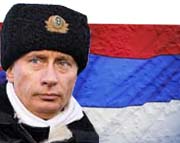NATO needs Russia, Putin says
 Bucharest - Urging cooperation from Western leaders, Russian President Vladimir Putin insisted Friday that NATO cannot solve the world's security problems without Russian help.
Bucharest - Urging cooperation from Western leaders, Russian President Vladimir Putin insisted Friday that NATO cannot solve the world's security problems without Russian help.
"What can be done without Russia?" Putin repeatedly asked after a meeting with alliance leaders in Bucharest which touched on such diverse global concerns as terrorism, the proliferation of weapons of mass destruction and security in Afghanistan.
Putin underlined the "constructive" and "positive" spirit of the talks in the Romanian capital.
But in a speech that mixed conciliatory tones with veiled threats, he also cautioned the alliance against spreading its influence to include former Soviet republics such as Georgia and Ukraine.
"The appearance of a powerful military bloc along our borders would be taken in Russia as a direct threat to our security," Putin said.
"And statements that it is not directed at us cannot be taken as sufficient. Security cannot be based on promises," he added.
Putin questioned the role of NATO after the collapse of communism, saying: "There is no USSR, there is no Warsaw Pact. Against whom does NATO exist?"
But he stressed there was no question of a return to the Cold War era and confirmed that Russia wished to play a bigger role in world affairs alongside NATO.
"We want to be heard. We want to address concerns and issues together," he said.
Speaking just before Putin, NATO Secretary General Jaap de Hoop Scheffer welcomed the "positive spirit" demonstrated by Putin in Bucharest, pointing to a transport deal on Afghanistan as evidence of an improvement in relations between the alliance and Moscow.
"There was no hiding of views, but the spirit was positive," the NATO chief said after the NATO-Russia Council (NRC).
Ahead of the NRC, the NATO chief had called on the Russian leader to steer clear of "unhelpful rhetoric" during the meeting.
And though he acknowledged that deep divisions remained, he expressed satisfaction at the fact that Putin had helped produce "constructive" talks in Bucharest.
"This morning I am not complaining about unhelpful rhetoric," de Hoop Scheffer said.
During the course of the meeting, NATO and Russia formalized a transport agreement in support of the alliance's International Security Assistance Force (ISAF) in Afghanistan.
The deal will allow non-lethal goods destined for ISAF to be transported through Russian territory on their way to Afghanistan.
The NATO-Russia Council (NRC) was established at a 2002 meeting in Pratica di Mare, near Rome, as a means of fostering mutual understanding.
But relations between NATO and Russia have progressively worsened since, reaching one of their lowest post-Cold War points over the past year.
Disagreements cover a variety of issues, including Kosovo and NATO expansion.
And Putin was less than pleased with Thursday's announcement that the United States and the Czech Republic had reached an agreement to site elements of a US anti-ballistic-missile system on Czech soil.
The radar in the Czech Republic, which the US says is intended to protect the West from rogue states such as Iran, will be part of any future NATO missile defence system.
The Kremlin objects to the US plan, arguing that it poses a threat to its own security and deterrent capability, and has suspended its participation in the Treaty on Conventional Forces in Europe (CFE) in response.
Speaking Friday, de Hoop Scheffer acknowledged that "no stunning breakthroughs" had been achieved in Bucharest, but underlined the importance of holding such regular meetings with Russia.
"We use the NRC to discuss items we agree on ... but even more importantly, we use the NRC on the items we do not agree on, be it enlargement of NATO, be it the adapted CFE treaty, be it Kosovo," he said.
Friday's brief NRC - lasting only about one hour - took place in Bucharest's Palace of the Parliament, a monstrous 330,000-square- metre mansion built during the regime of former communist dictator Nicolae Ceausescu.
It was the first to be attended by Putin since its creation and the last by his US counterpart, George W Bush.
The two leaders were due to meet again in the Black Sea resort of Sochi over the weekend. (dpa)